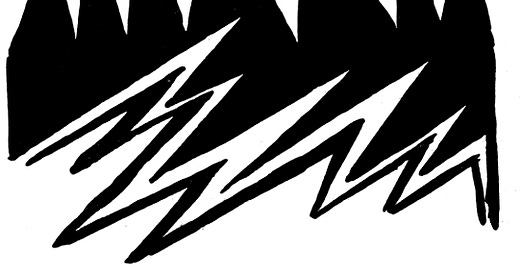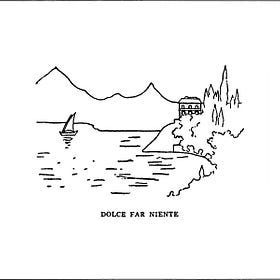Mary Brent Whiteside - Half Songs (1925)
Forgotten Poems #32: The Book of Lost Rhymes
—: Half Songs :—
How little songs that never came to birth, Trouble the earth! Our fingers touch and let them pass; They vanish, whispering through the grass; Sweep like a sigh across a singing pine, And shine In the lost poetry of a blackbird's flight. The amber flame of candle light, Catches and lets them go,— Perhaps because they tremble so! Songs that are finished, fill a page. Prisoned as birds are, in a cage, They live a century or a day, But little half songs—who shall say?
Mary Brent Whiteside (1876-1962)
P: The Madrigal (1917), The Texas Review (1919), Contemporary Verse (1919-25), Tempo (1921), The Lyric West (1921-26), American Poetry Magazine (1928); A: The Best Poems (1926), The Lyric South (1928), Georgia Poets (1932); C: The Eternal Quest & Other Poems (1925); plays, articles, etc.
Lived in Atlanta, Georgia. On the editorial staff of the Southern Literary Magazine; editor of The Stepladder.
Mary Brent Whiteside — Poetry & Higher Space (1919):
“It has been to the detriment of life in general, and of poetic art in particular, that throughout all ages the same minds have so rarely been interested both in mathematics and in poetry... Yet to understand poetry, or indeed any art, fully and completely is to understand the basic unity of life, and to grasp the essential fact that the same rhythm manifests through all its activities, with a difference solely in vibratory rate.”
“Poetic art is reducible to a mathematical science, but it is not the mathematics of the elementary classroom; it is that of higher space. And so far from limiting the field of poetic expression, or depriving the greatest of arts of that magic which is its divine heritage, such an admission serves as a potent password, opening to our enchanted gaze new and splendid vistas of wonder and beauty... For since the 'music of the spheres' is by no means a mere figure of speech, it follows that when the 'morning stars sang together', it was undoubtedly to the narrator a very real and audible harmony.”
“Henri Bergson in his famous definition of art has said, 'Whether it be painting or sculpture, poetry or music, it has no other object than to brush aside the utilitarian symbols, the conventional and socially accepted generalities, in short everything that veils reality from us, in order to bring us face to face with reality itself,—Art is certainly only a more direct vision of reality'. Now since 'reality' here clearly does not refer to the physical world, at least in its more obvious aspects, it must relate to something apprehended upon that higher plane which mathematics designates as the 'fourth dimension', and to which metaphysics and occultism have given various names according to their several schools and teachings . . .”
While the shift from formal rhymed verse to ‘free’ and unrhymed verse in the late-1800s and early-1900s was important, even more significant was the shift from the statement as the basic unit of poetry, to the fragment. In a poetry of statements ‘meaning’ resides in the poet, already completed, and it is the reader’s job to decipher the ‘true’ meaning of the poem, in accordance with the poet’s intentions. In a poetry of fragments, on the other hand, there are always multiple possibilities, and no one singular meaning. Sensible signification is abandoned in favour of suggestion. A fragment is always in-between and partial, and can only be completed by the reader in collaboration with the poet. A statement is already finished: a fragment invites the reader to continue, without stopping.
As Gaston Bachelard writes in The Poetics of Space (1958): “Make of the reader a poet... the joy of reading appears to be the reflection of the joy of writing, as though the reader were the writer's ghost. At least the reader participates in the joy of creation that, for Bergson, is the sign of creation.”
If you want to write, by dick whyte if you want to write, then write bro ken & mended in rhythms short & long sing your song: your heart will do the rest xoxo dw
Forgotten Poets Presents:
Forgotten Poems, a living anthology of obscure and out-of-print poetry from the late-1800s and early-1900s. Explore the archives:
More from The Book of Lost Rhymes . . .
Albert Edmund Trombly - The Trees (1922)
—: The Trees :— Through the afternoon the breeze, Looses leafy tongues of trees. Nodding heads accentuate, What the leaves articulate...
Alice M. Fay - 5 Poems & Pictures (1912-24)
—: Where? :— Where is the life of the lily That so proudly reared her head? Where is the radiant beauty Of the rose that was warm and red? Where is the smoke of the incense That vanished into the air?...
More poems about fragments . . .
Helene Mullins - The Importance of Being (1922)
—: The Importance of Being :— I am but a fragment Of the universe. Yet I am not so insignificant...
Helen Birch Bartlett - October in Illinois (1926)
—: October in Illinois :— October— A blood-red line, Low in the western sky— Grey everywhere— Cold and clear The frozen yellow fields— Nearness and distance interchangeable— A single rabbit-hawk...














Lovely. She seems so brilliant! Unborn poetry, what a conception. The essay was very illuminating for me. Thanks for this!
Gorgeous! For me, this is also what collage is. A poetry of fragments. A collection of all that which is most alive and half-formed. A teeming collection of thoughts unfinished, sentences unended. A call for a reply. It is a mathematics of a higher space, that the parts are always greater than the sum.